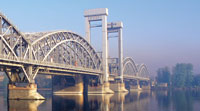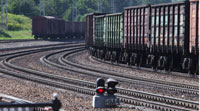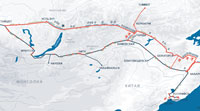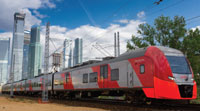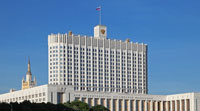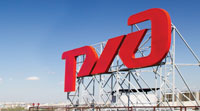Statement from the Management Board Chairman and President

Vladimir Yakunin Chairman of the Management Board and President Russian Railways |
Dear Partners and Colleagues, For Russian Railways, last year featured a number of important events. The first few months of the year were spent preparing for and holding the XXII Winter Olympic Games and XI Paralympic Games in Sochi as almost 5 million passengers chose railway transportation as their means of travel to and around the capital of the “White Olympics”. The tremendous work performed by Russian Railways employees did not go unnoticed: the country’s leaders, athletes taking part in sporting events as well as Russian and foreign guests at the Sochi games offered high praise for the contribution made by railway workers to the overall success of the Olympics. |
Another important event of 2014 was the start of a new development stage in the Eastern operating domain of Russia’s railway network. It’s symbolic that this took place on the forty-year anniversary of the start of construction on the Baikal-Amur Mainline. Russian President Vladimir Putin has taken personal control over the development of the project to modernise the Baikal-Amur and Trans-Siberian Mainlines as well as the execution of orders for its funding.
December marked the five-year anniversary of the Sapsan high-speed train, which has become extremely popular with more than 15 million passengers using its services. Sapsan has launched a new era in passenger transportation in our country.
The Company received numerous prestigious prizes and awards for its activities in 2014, including the Prize of the Russian Government for Quality, an international prize from the Institute of
Certified Financial Managers (ICFM) in the category ‘Best Company in Terms of the Effectiveness of the Internal Control and Audit System’ in addition to many other awards.
Overall, 2014 was a challenging year for the Russian economy. Several companies incurred losses due to a slowdown in economic activity, a decrease in investments and the effects of sanctions against Russia and volatile global markets. This also made it a much more difficult year for Russian Railways as the influence of unfavourable external factors was exacerbated by the government’s decision to abolish the indexation of freight transportation tariffs.
This decision was made based on forecasts projecting GDP growth of 3% and a 2.2% increase in industrial production with inflation being kept under 5%. Curbing the tariffs of natural monopolies was designed to stimulate industry and contribute to a slowdown in inflation. However, this has not been the case as economic realities have differed dramatically from the official forecasts: inflation totalled 11.4% (December vs. December) while GDP growth practically ceased altogether.
Moreover, the Company had to mobilise internal reserves to compensate for the effect of increased tax payments and insurance premiums — total tax payments grew from RUB 236.1 billion in 2013 to RUB 253.3 billion in 2014 (due to the abolishment of property tax exemptions and growth in insurance premiums).
This makes it all the more impressive that we were able to adequately overcome these difficulties by implementing a number of anti-crisis measures and reducing transportation costs by 2.7% compared with 2013.
The contribution by Russian Railways to the development of the national economy received special recognition by the country’s leaders during the final meeting of the Company’s Management Board. Railway workers are implementing major projects which the economy needs and from which the cumulative effects significantly outweigh the amount of capital investment.
The development of Russia’s railway infrastructure is the ‘locomotive’ that can ‘rescue’ the economy: 19 domestic industries are involved in implementing projects of the Russian Railways Group and generate a multiplier effect of RUB 1.46 for each rouble of our investment.
We are increasingly offering customers not just shipment, but door-to-door freight delivery and international shipments involving several types of transportation. In order to further develop this aspect of business, we have established United Transportation and Logistics Company (UTLC) jointly with the national railway companies of Belarus and Kazakhstan. UTLC is an operator with network business coverage and sales outlets at the main industrial centres of Eurasia.
UTLC aims to ensure the development of the transportation and logistics infrastructure of Belarus, Russia and Kazakhstan, thus making it more efficient to use their transit potential between countries of the Asia-Pacific Region and Europe, which experts say may surpass 1 million TEU by 2021.
Thanks to the use of cross-industry and interregional transportation tools, we have a proven and scientifically substantiated base for future freight shipments via Russia’s railway network.
This method has already been applied when preparing the modernisation project for the Baikal-Amur and Trans-Siberian Mainlines.
The construction of the Moscow-Nizhny Novgorod-Kazan High-Speed Railway will provide a significant contribution to the country’s GDP and the economy of neighbouring regions. A key condition of the project’s resource plan is at least 80% production localisation, including materials, components, equipment and the work of specialists. In December 2014, the fundamental decision was made to start work and allocate funding for these purposes.
The Company is continuing work in other areas as well, including in international cooperation. Major agreements and documents on partnerships in railway transportation have been signed, including on high-speed transportation with China. An agreement on the involvement of Russian Railways in the development of Ulan-Bator Railways was reached with Mongolia. A new shipping terminal at the Rason port (DPRK) with capacity of 5 million tonnes has been put into operation. The first demonstration shipments of Russian coal to China and South Korea took place in 2014. A project for the construction and electrification of a second railway from Belgrade to Pancevo in Serbia entered the practical implementation stage.
In presenting the annual report of Russian Railways for 2014, on behalf of the Management Board and myself, I would like to thank the Company’s entire team, our colleagues, partners and customers for their trust and support. The success of Russian Railways was made possible by team spirit and high levels of competence of railway workers, effective work with young people and close cooperation with unions at all levels. I am confident that together we will overcome the latest challenges and do everything we can for our country’s successful socioeconomic development.

